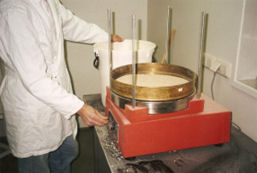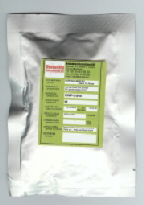White Korean ginseng - Root powders
Processing
After the dry White Korean Ginseng roots have been analyzed and selected, a special machine grinds them into a fine powder. The powder is sifted according to the desired size after which it is mixed mechanically. |
The Ginseng powder is processed mechanically until it has the right particle size. |
When larger granules are requested instead of a fine powder, a special cutting machine can cut up the roots to the desired particle size.
To obtain powders or kernels with a standardized ginsenoside content, roots with a different ginsenoside content are mixed in such a way that the required ginsenoside content is achieved.
The highest possible amount of ginsenosides in White Korean Ginseng root powder is approximately 7-8%.
Composition root powders
Some people feel that ground root powder is better than ginseng extract-powder. This is based on the assumption that the ground root powder is closer to the original plant and contains more of the naturally present ingredients. They believe some of these valuable constituents could have been lost in the extraction process.There are some exceptions, but almost all White Korean Ginseng root powders are free of carriers and additives. Of course we can add these upon your request.
Packaging
For amounts less than 25 kg, White Korean Ginseng root powders or kernels are packed per 1 kg in airtight aluminum bags with PE-inner layer. Bags with 5 kg are also available. |
White Korean Ginseng root powder (product code: KWPGG60) standardized with 6% ginsenosides, packed per 1000 g in airtight aluminum bag with PE-inner layer. |
The 25 kg packaging are packed in standard plastic bags in cardboard boxes or barrels.
Properties
White Korean Ginseng root powders do not dissolve in water. The color is light yellow to beige.The taste of this white Korean ginseng root powder can be qualified as bitter-sweet. As the level of ginsenosides rises, the root's bitter taste intensifies and the sweet taste declines.
The active ingredients in Ginseng roots (ginsenosides) are heat-resistant, and are not damaged or lost when heated.
Additives
To reduce the cost of the powder adding a filler is an option. The cheapest filler is ground rice flour. Other possible additives include dicalcium phosphate, malto dextrin, silicon dioxide, magnesium stearate or glucose powder. Of course other additives, carriers or fillers are possible too.Dosage
In-vitro-tests have shown that the absorption of ginsenosides from extracts is double the absorption of dried ginseng roots or root powders. Counted in milligrams, this means that in order to get the same results a double dose of ground root powders is needed in comparison to extract powders.For optimal therapeutic results from White Korean Ginseng root powders it is advised to take 30-60 mg of pure ginsenosides daily. For a root powder with 6% ginsenosides this means a daily intake of 500-1000 mg per day.
Practical experiences have demonstrated that activity and effects of Ginseng do not decline proportionally as a daily dose is lowered.
There is no dangerous (damaging) maximum daily dose, but 7 mg ginsenosides is considered as a minimal dose. If you take less than 7 mg a day it will most likely not contribute anything.
When mixed with other medicinal herbs, a lower dose of White Korean Ginseng might be sufficient.
 |
 |
| previous | next |
